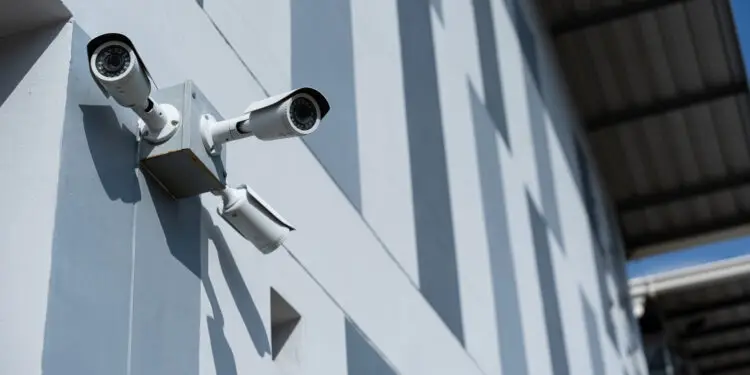Table of Contents
A video security system can serve many functions. In today’s digital age, ensuring the safety and security of your small business premises is more critical than ever. With advancements in technology, video security camera systems have become an indispensable tool for business owners. They not only deter potential intruders but also provide invaluable insights into daily operations, customer interactions, and much more.
This comprehensive, small business security best-practices review aims to explore the top 10 video security camera systems designed for small businesses, including Avigilon, Axis, Hanwha, Hikvision, Lorex, Ring, ADT, Arlo, Verkada, and Swan. We will delve into each brand, highlighting their key features, pros, and cons, to help you make an informed decision that best suits your business needs.
Understanding Business Security Camera Systems

Before we jump into the specifics of each brand, let’s discuss the general concept of how business security camera systems work and what they aim to accomplish. At their core, these systems are designed to monitor and record activities within and around your business premises. The primary purposes include deterring theft and vandalism, ensuring the safety of employees and customers, and providing evidence in the event of an incident.
Modern security camera systems leverage a variety of technologies, including high-definition video, motion detection, night vision, and remote access capabilities, allowing business owners to monitor their premises in real-time from anywhere in the world. These systems can range from basic setups with a few cameras to complex networks covering multiple locations, integrating with other security measures such as alarms and access control systems.
Top 10 Video Security Camera Systems for Small Business: A Comparative Review
1. Avigilon
Company Overview: Avigilon, a Motorola Solutions company, is renowned for its advanced and scalable video analytics and surveillance solutions. With a focus on delivering high-quality, AI-driven products, Avigilon aims to transform the way businesses perceive and interact with their security systems.
Key Features:
- High-definition video quality
- Advanced video analytics powered by AI
- Scalable solutions for businesses of all sizes
- Integration capabilities with other security systems
Pros:
- Superior image clarity
- Cutting-edge AI analytics
- Scalable and customizable
- Reliable customer support
Cons:
- Higher price point compared to some competitors
- Complex setup may require professional installation
2. Axis
Company Overview: Axis Communications specializes in network video solutions for professional installations, pioneering in developing innovative surveillance and security technologies, including IP cameras and video encoders.
Key Features:
- Wide range of IP cameras
- Open platform for easy integration
- Advanced security features and encryption
- Environmental durability
Pros:
- Extensive product range
- High-quality video
- Strong focus on cybersecurity
- Durable and reliable in various conditions
Cons:
- Premium pricing
- May require additional software for full functionality
3. Hanwha
Company Overview: Hanwha Techwin America is a part of the Hanwha Group, a South Korean conglomerate. The company focuses on providing innovative security solutions, including high-quality video surveillance products for a wide range of business applications.
Key Features:
- Wide dynamic range and clear imagery in various lighting
- Advanced video analytics
- Cybersecurity features to protect system integrity
- Easy integration with existing systems
Pros:
- Excellent image quality in diverse conditions
- Strong focus on cybersecurity
- Comprehensive video analytics capabilities
Cons:
- Pricing can be on the higher side
- The interface might be challenging for beginners
4. Hikvision
Company Overview: Hikvision is a world-leading provider of security products and solutions. Featuring an extensive and highly skilled R&D workforce, Hikvision manufactures a full suite of comprehensive products and solutions for a broad range of vertical markets.
Key Features:
- Broad range of products including smart IP cameras, HD analog cameras
- Powerful video analytics
- Reliable performance in various environmental conditions
- User-friendly operation and easy setup
Pros:
- Versatile product range suitable for different needs
- High-quality video performance
- Advanced features at a competitive price
Cons:
- Concerns over data privacy and security
- Complex settings may require professional assistance
5. Lorex
Company Overview: Lorex is a Canadian company that provides high-quality, professional-grade surveillance systems. Lorex specializes in DIY (Do It Yourself) security cameras and monitoring solutions for residential and small business applications.
Key Features:
- High-definition video quality
- Wide selection of camera styles and systems
- Easy installation and user-friendly interface
- Advanced features like night vision and motion detection
Pros:
- Cost-effective solutions
- Easy to install and manage
- Robust build quality and reliability
Cons:
- Limited third-party integration
- Customer support can be improved
6. Ring
Company Overview: Ring is well-known for its video doorbells but has expanded its offerings to include a variety of home security products. Ring’s systems are designed with ease of use in mind, offering comprehensive security solutions that integrate seamlessly with smart home ecosystems.
Key Features:
- Wide range of security products including cameras, sensors, and doorbells
- Easy DIY installation
- Integration with Amazon Alexa for smart home control
- Affordable subscription plans for video recording and sharing
Pros:
- User-friendly and easily integrates with smart homes
- Affordable and flexible pricing options
- Effective community alert system
Cons:
- Subscription required for full feature access
- Limited customization options for advanced users
7. ADT
Company Overview: ADT is one of the most recognized names in the home and business security industry, offering a wide range of security, fire, and life safety solutions. ADT’s systems are professionally installed and monitored, providing comprehensive protection.
Key Features:
- Professional installation and monitoring
- Wide range of security and automation products
- Customizable security solutions
- Remote access and control via mobile app
Pros:
- Extensive experience and reliability
- Professional 24/7 monitoring services
- Comprehensive security and automation solutions
Cons:
- Higher upfront and monthly costs
- Long-term contracts required for the best pricing
8. Arlo
Company Overview: Arlo Technologies specializes in wireless surveillance cameras and security systems. Arlo’s solutions are designed for simplicity, ease of use, and flexibility, catering to both home and small business users.
Key Features:
- High-quality wireless and wire-free cameras
- Easy to install and expandable systems
- Advanced features like 4K video, night vision, and motion tracking
- No contracts and flexible subscription plans
Pros:
- High-quality video and advanced features
- Easy installation and user-friendly
- Flexible no-contract subscription plans
Cons:
- Battery life can be limited for wire-free models
- Higher cost for premium features
9. Verkada
Company Overview: Verkada is a relatively new entrant to the security industry, offering cloud-based surveillance solutions that are simple to deploy, manage, and scale across multiple sites. Verkada emphasizes cybersecurity and ease of use in its product design.
Key Features:
- Cloud-based management and storage
- Built-in advanced analytics and machine learning
- Scalable across multiple locations
- Strong focus on cybersecurity and user privacy
Pros:
- Easy to manage and scale
- Advanced analytics and AI features
- Strong cybersecurity measures
Cons:
- Relatively expensive
- Dependent on internet connection for full functionality
10. Swann
Company Overview: Swann is a global leader in DIY security monitoring solutions, known for its innovative surveillance technology and affordable security products. Swann offers a wide range of security cameras and systems tailored for home and small business use.
Key Features:
- Affordable, high-quality surveillance solutions
- Easy DIY installation
- Free local storage with no monthly fees
- Smart security features like heat and motion detection
Pros:
- Cost-effective solutions with high-quality video
- Easy to set up and use
- No subscription fees for basic features
Cons:
- Limited advanced features compared to competitors
- Customer service could be improved
Features to Consider When Choosing Security Cameras for Your Business
When selecting a security camera system for your business, several key features can significantly impact its effectiveness and suitability for your needs. Understanding these features will help you navigate the myriad options available and select a system that offers the best protection and value.
Storage Capacity
- What It Does: Determines how much video footage can be stored before it needs to be overwritten or archived elsewhere.
- Business Impact: Affects how long you can retain footage for review. Larger capacities allow for longer archival periods, crucial for investigating incidents that might not be discovered immediately.
Field of View
- What It Does: Defines the extent of the area a camera can cover, typically measured in degrees.
- Business Impact: Influences how many cameras you need and their placement. A wider field of view can cover more area with fewer devices, potentially reducing costs and complexity.
Camera Options (Functionality such as Tilt, Pan, Zoom, etc.)
- What It Does: Allows the camera to move and zoom, either manually or automatically, to follow activities or inspect details.
- Business Impact: Enhances surveillance flexibility and effectiveness, enabling close monitoring of suspicious activities or individuals.
Power and Connectivity
- What It Does: Covers how the cameras are powered (battery, wired) and how they connect to the network (Wi-Fi, Ethernet).
- Business Impact: Affects installation complexity and location flexibility. Wireless cameras offer easier installation and relocation, while wired cameras may provide more reliable power and data transmission.
Smart Device Compatibility
- What It Does: Enables integration and control of the camera system through smartphones, tablets, or voice-controlled smart home devices.
- Business Impact: Offers convenience and enhanced control, allowing business owners to monitor their premises remotely and receive alerts on the go.
Styles of Cameras
Different styles of cameras serve varied purposes, catering to specific surveillance needs and environments. Here’s a breakdown of the most common types:
PTZ (Pan, Tilt, Zoom) Cameras
- Description: These cameras can pan (move horizontally), tilt (move vertically), and zoom in on specific areas for detailed observation.
- Ideal For: Areas requiring active monitoring and the ability to focus on different parts of the scene, such as parking lots or large retail spaces.
Bullet or Telescope Cameras
- Description: Named for their elongated, cylindrical shape, these cameras are easily recognizable and can deter potential intruders simply by their presence.
- Ideal For: Outdoor use, as many come with strong weatherproofing and long-range viewing capabilities.
Dome Cameras
- Description: Enclosed in a dome-shaped housing, these cameras are more discreet and resistant to vandalism.
- Ideal For: Indoor and outdoor applications where a less obtrusive appearance is preferred, such as retail spaces.
Turret Cameras
- Description: Also known as eyeball cameras, these offer a compact design and the flexibility to adjust the angle of view.
- Ideal For: Both indoor and outdoor settings, providing a balance between discretion and deterrence.
Box Cameras
- Description: The traditional camera style, known for its straightforward design and high-quality image capture.
- Ideal For: Situations where changing lenses for different focal lengths or specialized imaging needs is necessary.
Pros and Cons of Storing Archive Footage in the Cloud vs Onsite DVR
Cloud Storage:
- Pros:
- Easy access from anywhere, enhancing remote monitoring capabilities.
- Reduced risk of data loss due to onsite incidents (e.g., fire, theft).
- Scalable storage options based on subscription plans.
- Cons:
- Ongoing subscription costs.
- Potential security concerns regarding data interception.
- Dependent on internet connectivity for access and backup.
Onsite DVR (Digital Video Recorder):
- Pros:
- Complete control over your data with immediate access.
- No monthly subscription fees, making it cost-effective in the long term.
- Works independently of internet connectivity for recording and storage.
- Cons:
- Limited by physical storage capacity and the need for manual upgrades or maintenance.
- Susceptible to onsite risks, such as damage or theft.
- Requires physical presence for access and management.
Key Takeaways
Choosing the right video security camera system for your small business involves a careful evaluation of your specific security needs, premises layout, and budget. By considering the key features and understanding the different styles of cameras, as well as the pros and cons of cloud vs. onsite storage, you can select a system that provides the best protection for your assets. Remember, the goal is not only to deter potential threats but also to offer peace of mind, knowing your business is well-protected around the clock.
Since its inception in 2003, ForexTV has been a global leader in forex news and has expanded its news coverage to multiple industries. ForexTV is now one of the most recognized brands in global financial news. Mr. Kelly was also the creator and founder of Retirement Intelligence.
Mr. Kelly is an expert in data modelling, technical analytics and forecasting. Tim has extensive experience in online marketing, search engine optimization, content development and content distribution. He has consulted some of the top brokerages, media companies and financial exchanges on online marketing and content management including: The New York Board of Trade, Chicago Board Options Exchange, International Business Times, Briefing.com, Bloomberg and Bridge Information Systems and 401kTV.
After leaving management of ForexTV in 2018, he continues to be a regular market analyst and writer for forextv.com. He holds a Series 3 and Series 34 CFTC registration and formerly was a Commodities Trading Advisor (CTA). Tim is also an expert and specialist in Ichimoku technical analysis. He was also a licensed Property & Casualty; Life, Accident & Health Insurance Producer in New York State.
In addition to writing about the financial markets, Mr. Kelly writes extensively about online marketing and content marketing.
Mr. Kelly attended Boston College where he studied English Literature and Economics, and also attended the University of Siena, Italy where he studied studio art.
Mr. Kelly has been a decades-long community volunteer in his hometown of Long Island where he established the community assistance foundation, Kelly's Heroes. He has also been a coach of Youth Lacrosse for over 10 years. Prior to volunteering in youth sports, Mr. Kelly was involved in the Inner City Scholarship program administered by the Archdiocese of New York.
Before creating ForexTV, Mr, Kelly was Sr. VP Global Marketing for Bridge Information Systems, the world’s second largest financial market data vendor. Prior to Bridge, Mr. Kelly was a team leader of Media at Bloomberg Financial Markets, where he created Bloomberg Personal Magazine with an initial circulation of over 7 million copies monthly.










